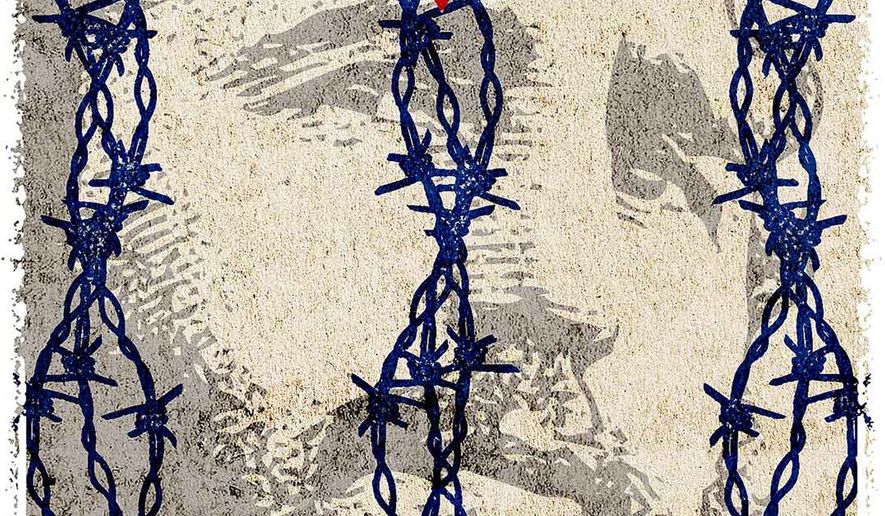OPINION:
Imagine a world in which you had no choices of your own and no hope of ever having anything or doing anything you dreamed of — a mere existence, not a life — driven only by survival, knowing that having your own desires was futile, and you faced imprisonment if you expressed yourself freely. This past Saturday, two Cuban military veterans risked their lives in a daring maneuver to escape this world by flying a motorized hang glider 90 miles across the Straits of Florida from communist Cuba to Key West.
The two Cuban men, David Lopez Alfonso and Ismael Hernandez Chirino, reportedly took the hang glider from the Cuban Aviation Club, a government-sponsored enterprise that provides sports services to foreign tourists. While their escape was bold enough to capture the attention of the international media, journalists should focus more on the reasons these young men risked their lives to escape Cuba, and why so many others have left the island in record numbers since the 1980 Mariel boatlift.
Cuba is a land of contradiction. Although the communist regime has spent more than six decades promoting the 1959 Cuban Revolution as a stride toward human rights and equality, Fidel Castro, Che Guevara and Raul Castro used their power to transform the island into a slave plantation, demoralizing their citizens into a permanent state of drudgery and forced labor, toiling in sugar cane fields and oceanside resorts reserved for foreigners who ignore their suffering.
While the Castro dynasty lives off these profits like millionaires, most Cuban civilians earn an average of $24 a month, surviving only in poverty and day-to-day starvation. The communist aristocracy enjoys everything while everyone else suffers.
To maintain this control, the Castro regime turned Cuban society into a military dictatorship. While our constitutional system guarantees individual rights, Cuba’s Soviet law constitution ensures that all rights are subject to the will of the Cuban Communist Party as the “socialist vanguard” of the state, and that one’s existence is driven by their obligations to the state. There is no individual ambition or innovation, and no chance for production or profit.
As such, life in Cuba has become an empty vacuum in which one merely exists as a spectator without any real hope of meaningful participation. Unlike the poverty one experiences in a free society, there is no opportunity to advance oneself, regardless of how hard someone works. Simply put, there is no “living” in Cuba, and this is why so many of its citizens are willing to risk the lives they have to escape. What they are really seeking in their escape is not just asylum from persecution, but rather the opportunity to live, to feel something other than despair — to have hopes and dreams — the elements that give anyone a sense of identity and self.
After more than 60 years of 12 million people enduring this monotony, Cuba has become a land of mass hopelessness and sadness. The heartbreak Cubans endure has become devastating and unbearable, which is why on July 11, 2021, millions protested in fury, the result of outrage stemming from decades of feeling controlled and heartbroken.
Since the death of Fidel Castro in 2016, Raul Castro and his newly appointed presidential surrogate, Miguel Díaz Canel, have foolishly let their fears get the better of them, tightening their grip on an educated mass of people who know they are being mistreated.
To quell dissent, Cuba’s National Assembly passed Decree 349, forbidding almost any form of free expression, outlawing artistic performances even in one’s own home. It also passed Decree 370, giving the regime plenary power to control all communication over the Internet. These two measures left Cubans with no escape either in cyberspace or in their own homes.
Those who are bold enough to express themselves risk being punished with “acts of repudiation” — home invasions committed by “neighborhood committees,” state-sponsored gangs ordered to trash people’s homes and intimidate and ridicule innocent women and children in a modern-day Kristallnacht the Castro regime borrowed from the early days of the Third Reich.
Despite these realities, some Americans blame sanctions for the misery Cubans face today, naively implying that the suffering on the island is based purely on economics.
As one Cuban refugee once told me: “It is sickening how some Americans use us as the reason as to why sanctions should be lifted, as if we are better off with a few crumbs just to continue living a slavelike existence. To them, our island is just a place to profit, a zoo for tourists who think it’s exciting to see what communism looks like while disregarding our suffering. Cubans don’t want an end to the sanctions. We want the regime to collapse once and for all so we can finally live free.”
Since their escape, the Cuban military dictatorship has called Messrs. Lopez Alfonso and Hernandez Chirino “deserters” and demanded their return. Considering the embarrassment the Cuban regime has faced and the outrage expressed by Mr. Díaz Canel, these two pilots will almost certainly face a grim fate should they be repatriated to the cruel existence they fled. Their applications for asylum warrant serious consideration as opposed to those from less oppressive countries who are merely seeking better economic opportunities.
Cubans take the chances they do because it is better to risk death than endure a lifetime in hell. Those who leave Cuba warrant serious consideration for asylum while those who remain deserve our unequivocal support by adamantly opposing — not enabling — a regime that enslaves its people.
• Jeffrey Scott Shapiro is a former Washington prosecutor who served as a senior adviser and director of the U.S. Office of Cuba Broadcasting, Radio Television Martí, from 2017 to 2021.




Please read our comment policy before commenting.